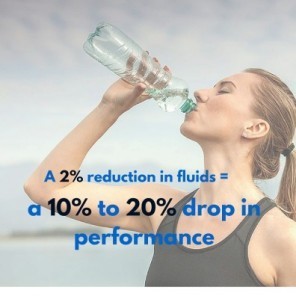Another blog about DRINKING MORE WATER….yes yes I know….
There’s a lot of debate surrounding recommended daily water intake. For years, the general rule of thumb was to drink between six and eight glasses a day, but this theory was dismissed as “thoroughly debunked nonsense” by the national media in 2011.
Lets just see some handy pointers to see if you are drinking enough of the good stuff! No not champagne..
Effects of dehydration on the body
A 2% reduction in fluids can result in a 10% to 20% degradation in performance. Dehydration can affect your performance during sport. It can lead to a loss of strength and stamina, causing fatigue. The tell-tale signs of dehydration are thirst and dark coloured urine. Dehydration can cause digestive issues, constipation and make you feel hungrier as your brain confuses hunger and thirst.
How much water should I be drinking?
Depends number of variables, not least the level of activity you plan to undertake. A marathon runner will obviously have different requirements to somebody who is doing a 30-minute weights session in the gym. Plus take into account if you are training in a boiling hot country too!
General guidelines suggest we drink two liters of water per day. But recommend increasing this by 500ml per hour of intense training. Increase this again if you tend to sweat a lot when you exercise. ECKA classes equal sweat. Get that 500ml down you!
Should I drink water before exercising?
This is where a lot of people come unstuck. You’ll bring a bottle of water to class, but by this point you’re already on the back foot unless you’ve topped up your fluid levels prior to your session.
Hydration should start well before you even step in to the dojo. Most people’s ‘go to’ drink first thing in the morning is coffee or tea, try having a glass of water upon waking as well as your usual caffeine hit. You’re most dehydrated when you wake up. Drinking water before exercising can help to prevent cramp just don’t gulp down gallons! Sip small quantities of water on a regular basis. Simples.
What to eat after a workout
While many of us fail to take hydration into account before our workouts, even more of us let ourselves down after an exercise session.
According to Nancy Clark’s Sports Nutrition Guidebook 4E – cited here by Human Kinetics – drinking 50% more fluid than you lost through sweat will help to boost your recovery. The guide also emphasises the point that the fastest way to recover is sipping small amounts of water regularly, rather than guzz ling down litre after litre in one go.
ling down litre after litre in one go.
It’s also important to remember that food plays a big part in keeping us hydrated. In fact, it’s widely recommended that 20% of your daily water intake should come from solid foods.
Fruits like bananas and dates are great for refuelling after a long run or intense training session. Fruits contain electrolytes and some fluids but it’s important to drink water as well as eat fruit, Here’s a particularly useful article on the best foods to eat to keep you hydrated.
How to spot dehydration
Our bodies can play tricks on us when our fluid levels start to drop. Effects of dehydration:
1. Check your muscles
Lean muscle tissue contains more than 75% water, so when the body is short on H2O, muscles are more easily fatigued. Staying hydrated helps prevent the decline in performance (strength, power, aerobic & anaerobic capacity) during exercise. When your muscles feel too tired to finish a workout, try drinking some water and resting for a bit before getting back to it.
2. Dry mouth
Honestly? I need to add nada here.
3. Pinch yourself (yes really!)
Skin elasticity, the skin’s ability to change shape and return to normal, is an easy way to check your hydration (though not 100% reliable for everyone). Using your pointer finger and thumb, simply pinch the skin on the back of your hand (not too hard!) and hold for a few seconds. When you let go, if the skin takes a while to return to its normal position, you may be dehydrated.
4. Are you feeling dizzy?
Feeling lightheaded during a workout is a sign of dehydration and a signal to tone it down a notch. Though willpower sometimes makes us want to push ourselves through, feeling dizzy is an indicator that it’s time to hydrate.
Drinking water is a habit. I increased my water intake by getting a 2 litre bottle of water, filling it each night with a slice if lemon in, then when I wake up I down half of it pretty much so its easily done by the afternoon. If I had to go to the tap for some reason I never drank hardly anything! I also set reminders in my phone to say DRINK WATER – yes I’m sad like that!
Right – ready to have a reason to drink more water? Get sweating and book yourself a free ECKA class today!

